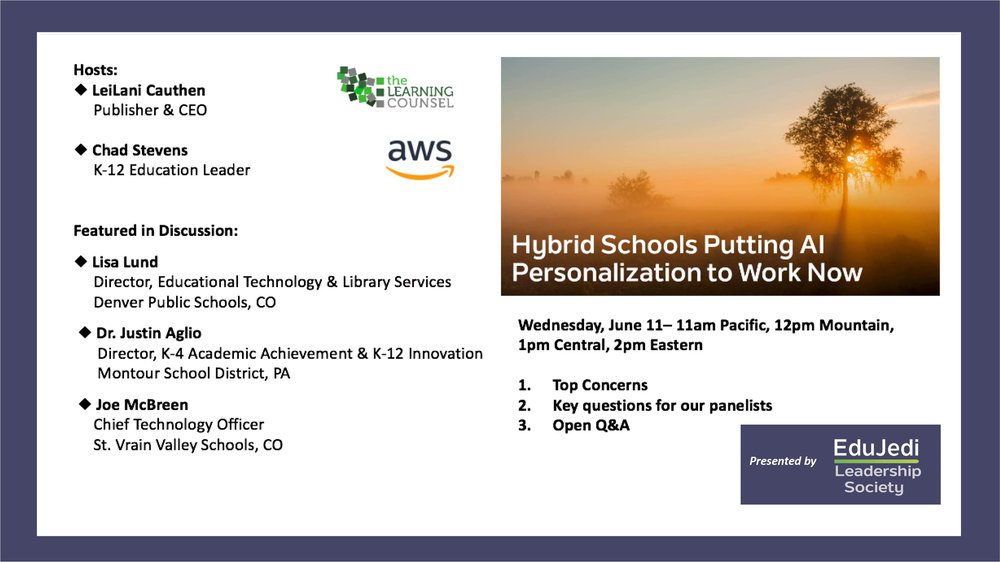As schools open this fall after a long hiatus, school and district leaders are searching for the best way to construct a hybrid model of learning and the best tools to help make learning a success. As a concept, artificial intelligence is all the rage, but in actual utilization, most districts are still in the gee-wiz phase. In fact, it’s still hard to agree on the definition of AI. So whether we’re talking about machine learning, algorithmic decision tree logic or real conversational AI, student-led personalized learning is within reach and a must-have for the COVID/post-COVID era of learning. In this episode of the Learning Counsel’s Dawn of New Strategies Virtual Discussion series, some of America’s leading educational AI practitioners participate in an informative and often surprising discussion about what AI is and isn’t, and how it is being used in schools to improve learning and create value for students and their families.
According to Dr. Chad Stevens, K-12 Education Leader at Amazon Web Services (AWS), “You'll never have less data than you have right this second. When you think about your school districts, even though many of us are just taking a deep breath from remote learning, data continues to grow at an exponential rate. And while schools are really data rich, we have a lot of data, but we really need that data to be easy, complete, actionable, shareable, and secure. And I think about these five V's - the volume, the velocity, the variety, the veracity, and the variability of this data is changing super rapidly. And so how we're able to visualize and value it is really important.”
LeiLani Cauthen, CEO and Publisher at the Learning Counsel further framed the issue. “There are a lot of questions about what's going on with the kids that are out there doing remote learning. You're not going to be eyeballing the kids all the time. We had to bring in data before this all started happening, but now the need is an imperative, you have to go this particular direction.
“One of the big Whys in the market is that consumerized learning competition is very real right now. Homeschooling has taken off. Everyone in American has been confronted with what it's going to be like to try to do this. Some of them are saying, ‘we’re out, this is real.’ And some of the polls that have gone out in the consumer markets suggest 50 percent of the American public are considering not coming back. You have a need as a score district to look at how well you're executing data to drive achievement, to drive personalization, to drive cost control in order to make sure you have kids coming back, you have enough appeal to say, yeah, yeah, we got it.”
Lisa Lund is the Director of Educational Technology and Library Services at Denver Public Schools. Lund said, “We've just started to look at what AI can do in our school district? How can it help support us? As a district of 92,000 students, knowing that we are an urban school district, we're looking at this through an equity lens. How can we take all that data and understand where kids are, what our kids need for support? Especially in the era of COVID, we all talk about the COVID slide. We know that is even stronger for our black and Brown kids in our district. And so how can we use AI to help support our kids to be successful?”
Dr Justin Aglio, Director of K-4 Academic Achievement & K-12 Innovation at the Montour School District. According to Aglio, “In one of the other hats I wear, I'm a visiting scholar at Carnegie Mellon University's Human-Computer Interaction Institute. We do a lot of beta testing through some of the new EdTech tools that they develop with us. One geometry tutor that our 10th grade students use is a complete AI system that teaches students geometry. And I'll never forget when I talked to our teacher, Greg Thompson about it, he said, “Wow, I have this new shift in how I teach within the classroom.
I'm going from this teacher-directed instruction to the student-centered instruction. Before I used to focus on covering the content, what skills do I need to teach today?’ But when he introduced his class to AI and using an adaptive software tutoring system, then he was able to shift from the content I need to teach today to focus on, okay, I need to teach this learner today, this student, the skills they need to go on and proceed.”
Joe McBreen is an Artificial Intelligence/Machine Learning Consultant and the former CTO St Vrain Valley Schools in Colorado. McBreen said, “Last school year, the school district started an artificial intelligence club. It started with eight high school students. I would just encourage everybody on the call sometime this next year to start an AI club, if you don't already have one. You've probably heard the old saying, what is the best way to learn something? Well, the answer is you teach it. And so, as an example, the eight students that are in our AI club in the school district are delivering summer AI, like Fundamentals to AI Class, to both middle schoolers and high schoolers. So that's an extension of their learning. And they are hands-on creating next school year’s AI curriculum, which will be deployed in three classes in different high schools.”
Watch the video
The quest for artificial intelligence is bringing real value to learners, and districts are finding ways to use data for individualized student-directed learning in the (soon to be) post-pandemic era. The panelists in this video are some of the nation’s leading experts, and you’ll enjoy their practical approach as they take their districts from point A to point B and beyond.











